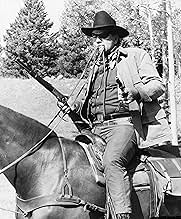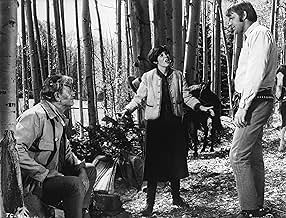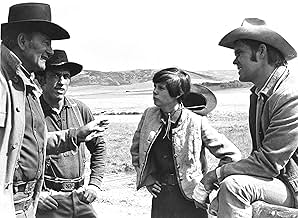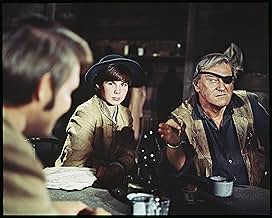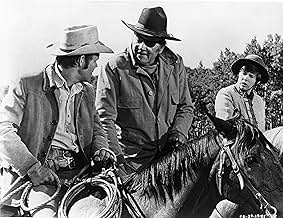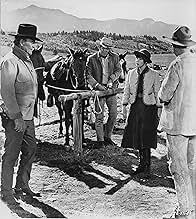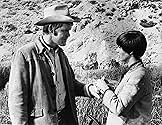Um marechal alcoólatra e um guarda-florestal do Texas ajudam uma adolescente teimosa a localizar o assassino de seu pai em território indiano.Um marechal alcoólatra e um guarda-florestal do Texas ajudam uma adolescente teimosa a localizar o assassino de seu pai em território indiano.Um marechal alcoólatra e um guarda-florestal do Texas ajudam uma adolescente teimosa a localizar o assassino de seu pai em território indiano.
- Direção
- Roteiristas
- Artistas
- Ganhou 1 Oscar
- 6 vitórias e 7 indicações no total
- Direção
- Roteiristas
- Elenco e equipe completos
- Produção, bilheteria e muito mais no IMDbPro
Avaliações em destaque
What True Grit does is succeed on both levels, being both great entertainment and giving John Wayne the acting role of a lifetime in the person of Rooster Cogburn.
Mattie Ross from Darnell and Yell County Arkansas personified by Kim Darby has come to Fort Smith seeking the killer of her father Jeff Corey. Turns out he's also killed a State Senator in Texas so Texas Ranger Glen Campbell informs her. Both of them team up with United States Marshal Rooster Cogburn who resides in Fort Smith with Chin Lee and my favorite movie cat, General Sterling Price.
Corey is now in the outlaw band headed by Robert Duvall at large in the Indian Nation Territory that became Oklahoma. True Grit's plot is the trio's pursuit of Duvall, Corey and the rest of the gang.
But oddly enough True Grit isn't really about plot. It's about the creation of a character. Like Margaret Mitchell who wrote Gone With the Wind with Clark Gable in mind for Rhett Butler, Charles Portis wrote the novel True Grit with only John Wayne in mind as Rooster Cogburn. It must have been one singular delight for Charles Portis to see the Duke flesh out Rooster Cogburn exactly as he conceived him.
Tough old Rooster, likes an occasional drink, isn't above a little larceny, but has one stern moral code about real bad guys. Bring him in dead or alive and make sure you shoot first coming up against them. And he's got quite the colorful past as he relates tales of his younger days to Campbell and Darby on the trail.
In other reviews I've said that John Wayne had one of the great faces for movie closeups. You can see a perfect example of that in that scene with John Fiedler who plays Darby's lawyer J. Noble Daggett. A man who rates high in the legal profession in that area having forced a railroad into bankruptcy.
The camera is facing Fiedler as he's talking to Wayne about his visit with Darby who's life Wayne saved. Wayne's got about a third of his face to the camera. But even with that third, your eyes are focused on the Duke and his reactions and then as the camera slowly pans around to Wayne in full face his reaction shots are hysterical. You don't work with scene stealing character actors like Chill Wills, Walter Brennan, and Gabby Hayes for 30 years without learning something.
John Wayne was up against some stiff competition in 1969 for the Best Actor Oscar. It was his second nomination, the first being for Sands of Iwo Jima. He was facing Richard Burton as Henry VIII in Anne of a Thousand Days and a couple of newcomers named Dustin Hoffman and Jon Voight for Midnight Cowboy. He was certainly the sentimental favorite.
If in no other place in our lives, sentiment does have its place in cinema. It was an honor well deserved, not just for one performance but for a lifetime of achievement in cinema being the player who put more people into movie seats than any other person ever. So many of the Duke's contemporaries like Edward G. Robinson, Errol Flynn, Tyrone Power were never even nominated for an Oscar much less win one.
Because the Motion Picture Academy has deemed this John Wayne's grandest cinematic achievement, it's almost a command to support this fine western and the man who defined the western hero and is still defining it.
This is perhaps best remembered today as the film for which John Wayne won his only Oscar. Halliwell's Film Guide rather ungraciously refers to it as a "sentimental Oscar, for daring to look old and fat", but there is more to Wayne's performance than that. The Academy, in fact, had tended to overlook Wayne, just as they overlooked the Western genre which provided him with most of his roles; well over a hundred films had only brought him two previous nominations. Cogburn, however, was one of his best roles. On the surface a hard-bitten, irascible old man, he has hidden depths to his character- not only the courage and determination implied by the phrase "true grit", but also a sense of humour and a capacity for tenderness. Cogburn is a lonely man, divorced from his wife and alienated from his only son, and his only friends are a Chinese storekeeper (a rare acknowledgement from Hollywood that not every inhabitant of the West was either white or an Indian) and his cat. A close relationship, however, grows up between him and the orphaned Mattie, for whom he becomes a substitute father. In turn, she becomes the daughter he never had- or perhaps even a substitute son.
Mattie is a complex character. There is much about her that is androgynous- her tomboy looks, her short hair, even her name, which can be short for Matthew as well as Matilda or Martha. She is brave and determined (there is a suggestion that the phrase "true grit" applies to her as well), but can also be a pain in the neck, especially to Cogburn. She is at times wise in the ways of the world and at others strangely innocent. She is part avenging angel, part bookish intellectual (shown by her rather formal language) and part vulnerable child. It is a role that called for an outstanding performance and got one from Kim Darby who was able to bring out all the various facets of Mattie's character. (This is the only film of hers that I have seen, but it seems strange on the strength of this that her subsequent cinema career has been so patchy). Unfortunately, Glenn Campbell, a singer with little previous acting experience, made a weak La Boeuf. It is probably as well that John Wayne did not get his way when he wanted Karen Carpenter, a singer with absolutely no previous acting experience, to play the role of Mattie instead of Darby. Great actors do not always make great casting directors.
"True Grit" does not perhaps have the depth of meaning of some of the truly great Westerns, such as "High Noon", "Unforgiven" or Wayne's last film, "The Shootist", but it is a very good one. It is a fast-moving and exciting adventure, notable for some beautiful photography of mountainous landscapes (although it is ostensibly set in relatively flat Oklahoma, it was actually filmed in Colorado and California), for one of the great iconic moments of the Western (the scene where Cogburn gallops alone into battle, guns blazing, against four opponents) and for two excellent performances in the two main roles. 7/10
A tough man on a tough hunt for a gang of toughs - it's John Wayne's film all the way, with this he passed into his last phase in the saddle with a continuous wink at the cowboy parody he had become and which no-one else will ever match. By now after 40 years he was an American legend, your giant avuncular instant-lawman starring in his next horse opera - True Grit would really be nothing special without him, with the fat old man it's a nice Western comedy. We in the audience knew he had Grit before he came on, Kim Darby was just too slow on the uptake. I never understood why the script was so uncharitable to the Texican horse-killing son of a bitch Campbell, he's belittled right up to the scenes in Mattie's family graveyard.
Overall a shot in the arm (or leg!) if seen every few years - even in 1969 entertaining action films could still be made!
Why this film hasn't had more votes and a higher rating in imdb is a complete mystery to me. I'm English, and I always thought the Americans really loved their westerns and John Wayne in particular. Can anyone explain please?
However, the film does look great. Handsomely shot with great scenery, True Grit is pleasing to the eye. Elmer Bernstein's score is rousing and very fitting, while the story is interesting, most of the characters are credible and the script flows well. Also True Grit is very well directed, and there is a glorious final shoot-out. Other than Campbell and Darby, the other acting is fine. While I would have not personally given the Oscar to this particular performance(I thought he was better in The Searchers, Red River and The Quiet Man) John Wayne is excellent here, and while he doesn't appear until quite later on Robert Duvall also makes a positive impression.
All in all, a very good film but could have been better in my view. 7/10 Bethany Cox
Você sabia?
- CuriosidadesStunt double Jim Burk performed the entire scene where Rooster Cogburn charged Ned Pepper's gang on horseback. John Wayne was only seen briefly in close-up, and he was riding on a trailer, not a horse.
- Erros de gravaçãoRooster reports Lucky Ned Pepper had robbed the KATY Flyer, a train that did not start running until 1896, long after the time in which the story is set.
- Citações
[Rooster confronts the four outlaws across the field]
Ned Pepper: What's your intention? Do you think one on four is a dogfall?
Rooster Cogburn: I mean to kill you in one minute, Ned. Or see you hanged in Fort Smith at Judge Parker's convenience. Which'll it be?
Ned Pepper: I call that bold talk for a one-eyed fat man.
Rooster Cogburn: Fill your hand, you son of a bitch!
- Versões alternativasWhen submitted for a rating from the MPAA in 1969, the film was given an "M". The film was edited and rerated "G". The American VHS version contains the "G" rated cut while the DVD is the uncut "M" version (which would be printed as "PG" since the symbol was changed in the 1970s).
- ConexõesEdited into O Show Não Pode Parar (2002)
Principais escolhas
- How long is True Grit?Fornecido pela Alexa
Detalhes
- Data de lançamento
- País de origem
- Central de atendimento oficial
- Idioma
- Também conhecido como
- Temple de acero
- Locações de filme
- Empresa de produção
- Consulte mais créditos da empresa na IMDbPro
Bilheteria
- Faturamento bruto nos EUA e Canadá
- US$ 276.418
- Fim de semana de estreia nos EUA e Canadá
- US$ 157.788
- 5 de mai. de 2019
- Faturamento bruto mundial
- US$ 276.418


